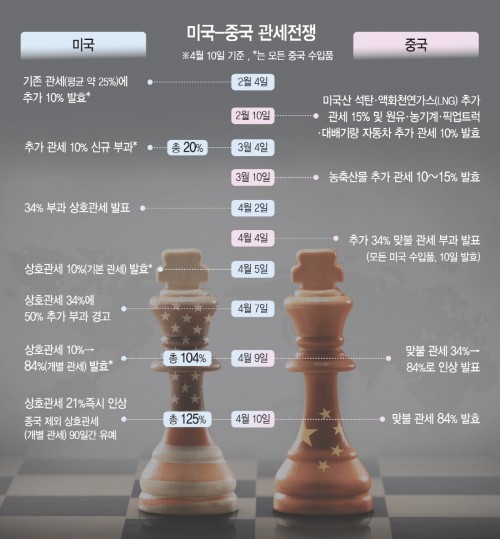 |
U.S. President Donald Trump on April 9 announced a steep hike in tariffs on Chinese imports, raising the rate to 125%, intensifying the ongoing trade war between the two countries. The decision follows retaliatory moves by both China and the European Union against earlier U.S. tariff hikes, with the dispute increasingly resembling a game of economic brinkmanship.
In a post on his social media platform Truth Social, Trump said, "The United States will immediately raise tariffs on China to 125%," citing what he called “a lack of respect from China toward the global market.” He referred to China’s decision earlier that day to increase its retaliatory tariffs from 34% to 84% in response to Washington’s previous 104% duties on Chinese goods.
Trump warned, “Hopefully, at some point in the near future, China will realize that the days of plundering America and other nations are no longer sustainable or acceptable.”
While taking a hard line against China, Trump also announced a 90-day suspension of new tariffs on more than 75 countries, citing their willingness to engage in negotiations. He said the temporary measure would allow time to pursue mutual tariff reductions of 10% during the grace period, which will take immediate effect.
“Over 75 countries have contacted our trade representatives at the Commerce Department, Treasury, and USTR to find solutions on trade, tariffs, currency manipulation, and non-tariff barriers. None of them have retaliated against us in any form,” Trump said.
Treasury Secretary Scott Bessent, speaking to reporters at the White House, said the 90-day delay was designed to give time for tailored negotiations with each country and added that Trump wanted to participate personally. When asked whether the move was a reaction to the stock market downturn, Bessent responded, “No, it's because of the overwhelming number of countries reaching out.”
Earlier in the day, Bessent stated at an American Bankers Association event in Washington that after reaching agreements with allies such as South Korea and Japan, the U.S. would partner with them to counter China.
He confirmed Trump had phone calls with Japanese Prime Minister Shigeru Ishiba and South Korean acting Prime Minister Han Duck-soo and noted that U.S. officials were also meeting a Vietnamese delegation the same day. “Ultimately, we believe we can come to an agreement with our allies and other nations,” Bessent said, adding, “They’ve been strong military allies, but not perfect economic ones—once that’s resolved, we can collectively address China.”
Bessent also claimed that the 10% reciprocal tariff policy unveiled by Trump on April 2 was intended for countries that chose not to retaliate—but that China had escalated its response.
“Unfortunately, when it comes to escalation, the biggest offender in the global trade system is China,” Bessent said. “They’re the only country that expanded the confrontation.”
Meanwhile, the European Union said it would impose tariffs ranging from 10% to 25% on $27.3 billion (€17 billion) worth of U.S. imports starting April 15. The tariffs target goods like peanut butter, hairspray, and other consumer products in retaliation for the Trump administration’s 25% tariffs on EU steel and aluminum.
Most Read
-
1
-
2
-
3
-
4
-
5
-
6
-
7





















